Michael Dods on the day Scotland out-Frenched France in glorious Murrayfield win
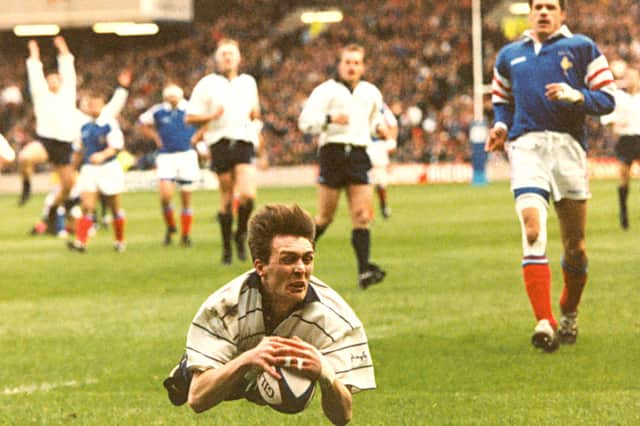

But 24 years ago against France, Scotland did something radically, drastically, sensationally different. I was in the Murrayfield crowd that afternoon and, although the memory can play tricks and I might have embroidered the moment, didn’t Gregor Townsend from almost under his own posts catch the ball on his nose? And pick up a bazooka to fire a 40-yard pass to Craig Joiner who settled the ball on his knee and made it talk like he was a vent act? And didn’t the ball then zip through the hands of every other player in the team, Doddie Weir and the muckle beastie Peter Wright included - a Harlem Globetrotteresque display of showboating reprised on a dozen other occasions before the 19-14 win was confirmed?
“Aye, just write that - sounds good!” laughs Michael Dods, the winger who scored all our points in a contest revered by all who witnessed it, which is why I’m using the excuse of the two countries meeting in the Autumn Nations Cup tomorrow to reminisce.
Advertisement
Hide AdAdvertisement
Hide Ad“That game definitely has its own mythology,” he adds. “I think you’ve got a wee bit carried away but what is true is that we ran the ball straight from kick-off and had decided before that’s what we’d do.
“The backs were me, Gregor, Shep [Rowen Shepherd], Jackie [Craig Joiner], Brushy [Bryan Redpath], Ian [Jardine] and Scott [Hastings]. In the team hotel before the game we told each other: ‘No one will expect this.’ France would have anticipated us kicking right back at them, up the touchline or a high ball. That was pretty much what every team did.
“Apart from Scott, who had bags of experience, we were all young, fit and, aye, maybe a bit daft. So Gregor collected the ball, there was a double-miss, and it came out to me on the wing. At first I think the crowd were astonished. Then came this tremendous roar.”
‘The most incredible match I ever played in’
And the roaring continued as the running continued. Scotland looked like they were on LSD. They looked like they’d stolen France’s clothes. “The French had a brilliant team and one of their greatest-ever back lines: [Thomas] Castaignede, [Philippe] Saint-Andre, [Emile] Ntamack, [Philippe] Carbonneau, [Thierry] Lacroix. They must have been thinking: ‘We normally do this to you.’”
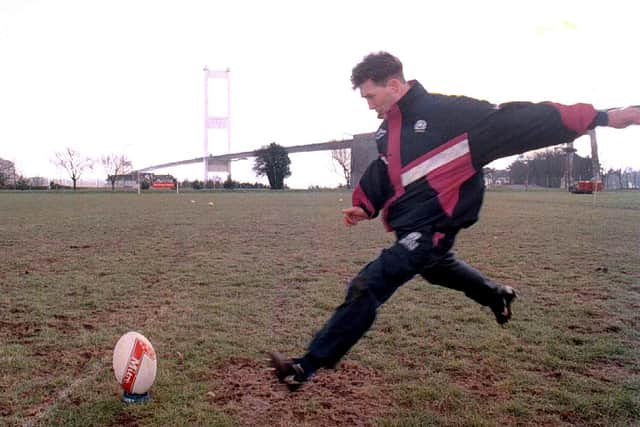

This was the second game of the Five Nations for Scotland following a win in Dublin. “That was unexpected. We were a new team. I scored my first try for my country that day, although from just a yard out. France were the lauded side. They’d already beaten England and were expected to continue on their merry way against us.”
Outside of our two Grand Slams, the last-ever Five Nations title and long-awaited wins in Cardiff and Paris, the game against Les Bleus on February 3, 1996 from a Scottish perspective probably rates as the most fun you can have with a rugby ball. “It was definitely the most incredible match I ever played in,” adds Dods, 51, the younger brother of ’84 Slammer Peter. “Rugby had just embarked on the professional era. Before then, for all but New Zealand, Australia and other big teams, the matches could be quite torrid. But that one I think showed it could be different, fast, exciting.”
As well as kicking three penalties, Galashiels-born Dods scored two tries and he admits there was a bit of fortune about both. “For the first one there was a ruck in the middle of the field. Brushy saw that their full-back [Jean-Luc] Sadourny had got caught up in it so he chipped into the space. I was like: ‘F*** sake, I’m going to have to chase this and look who I’ll be up against.’ [Laurent] Cabannes was renowned as one of the world’s fastest flankers but the passage of play leading to that ruck had gone on for ages and I got him in a foot-race at a good time because he seemed a bit puggled. I should tell you I ran from further back than halfway, shouldn’t I? Anyway I went past him and instead of him barging me, which would happen today, the ball took a very kind bounce right into my arms.
“The move leading to the second try started with a Brushy tap-penalty at the far end, then it was Gregor playing very flat and on the edge like Finn Russell does now. He brings Brushy back into it and he throws me a long spin pass. I remember thinking: ‘There’s only ten yards to go here, no one’s getting me, all I have to do is catch it.’ But there was a millisecond which could have been fatal. I took my eye off the ball before it was actually in my hands. I had a little juggle with it but managed to hold on.
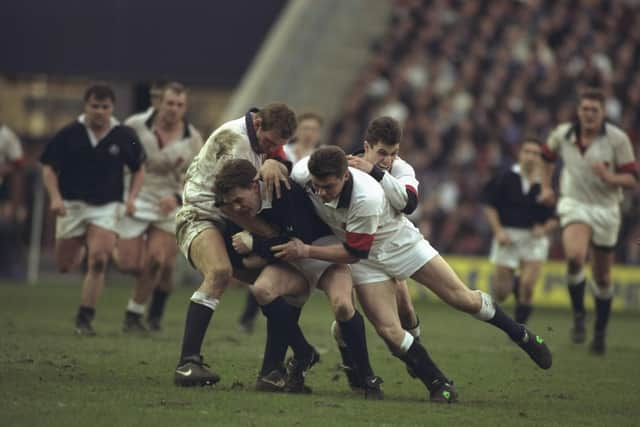

Advertisement
Hide AdAdvertisement
Hide Ad“The crowd were magnificent that day and never stopped cheering. We tried not to stop running: tap-penalties, quick restarts, the ball always moving. We were telling France: ‘If you’re going to beat us today this is how the game’s being played.’
You could have a few pints post-match in those days...
“I think when Scotland come up against the more fancied teams the element of surprise can be very useful - and the slow walk in ’90 [Slam decider against England] is the greatest example of that. The French have always been my favourite side to watch, right from when my brother played against the [Jean-Pierre] Rives-[Serge] Blanco team which had such unbelievable flamboyance. But I’ve got to admit that just on that day in ’96 they were probably a bit below their best.
“I remember asking the rest of our back three, Shep and Jackie: ‘Is this really happening?’ France did hit back and after I missed a couple of kicks I was worried the game might end up another of these glorious Scottish failures. Maybe folk thought that about the football team last week when Serbia equalised in the final minute but they came through and so did we. Afterwards the French were very gracious. You could have a few pints post-match in those days and we were so chuffed with ourselves. And that’s when somebody mentioned the s-word … ”
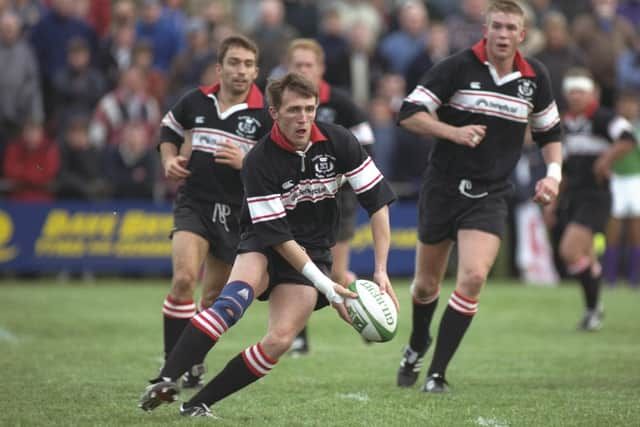

Slam. Scotland had almost achieved what would have been their fourth in history the season before, and a win in Cardiff in ’96 would have brought Richie Dixon and David Johnston’s men to the brink once more. “The word soon got banned. Wales were being written off, which was daft, and that game suddenly looked like the hardest of the championship because of what was riding on it. We didn’t play well down there and right at the end they missed a kick to draw.”
Scotland squeezed past the Welsh 16-14 and Dods remembers “a ton of hype” in the lead-up to the final match against England back at Murrayfield, with much of it focused on his chance to emulate big brother. “We were probably seen as favourites for that game which I don’t think is ever a good fit for a Scottish team.” England won 18-9 to poop our party, Dean Richards revelling in the role of principal killjoy. “Everywhere we put the ball he would turn up first - he strangled us. But I didn’t have a particularly good game and missed too many kicks. There was a good chance it would all come down to who kicked best and I decided to tweak my style, which was probably the wrong thing to do. I didn’t hang around afterwards and headed back down the Borders to my local, the Clovenfords Hotel. I knew everyone would be desperately disappointed with the result and I just wanted to be among friends.”
Keeping up with big brother Peter
There are ten years between the Dods boys but that didn’t deter Michael from trying to keep up with Peter. “There was a cow field at the back of our house where we’d chop down trees for goalposts. We were kicking for Grand Slams even then and had to be quick about it because our dad was the local gamekeeper and there was always the risk of a bollocking, even worse if the estate owner caught us.”
He remembers the moment when Peter was called up for his first representative honour. “The phone rang, there was a Scotland select game in the Netherlands and Andy Irvine couldn’t make it. That was going to be Pete’s first time on a plane. I just thought: ‘Wow, I want to do that.’” Michael was at Murrayfield in 1984 to see Peter’s Slam dream come true and later caught up sufficiently with his brother to appear alongside him for Gala and, just once in the dark blue, in a tour game in Canada. “That was a proud day for us. Pete didn’t overdo the advice, reckoning I should grow up my own man and my own player. But he did say I should grab every moment and enjoy them because it would all go by in a flash. He was right about that.”
Dods - dad-of-two, Cheltenham-based and now a marketing manager for the Under Armour sportswear company - won eight caps, the last being that Slam failure. His debut in Ireland in 1994 literally did pass in an instant, as he explains: “That was my first time on the bench, in the days when it was ‘blood only’ for replacements, but I was convinced I’d get a chance. I told Carl Hogg and he said: ‘You’re away with the fairies. Dougie Wyllie sat on the bench something like 40 times and only played once.’ But then Gavin Hastings cracked his head open. I ran down from the stand at top speed in time for a scum to collapse, re-set and collapse again - then the referee blew for half-time. It was Ireland to re-start. There were no kicking tees back then so Eric Elwood was trying to build a mound out of sand but the ball kept falling over. Then Gavin re-appeared, all bandaged up. My game was over after all of eight seconds. And to think if Eric had sorted out his mound it could have been 11! It looked like all I might take away from the day was a slice of orange but at the reception it was ratified as an actual appearance and I got my tie.”
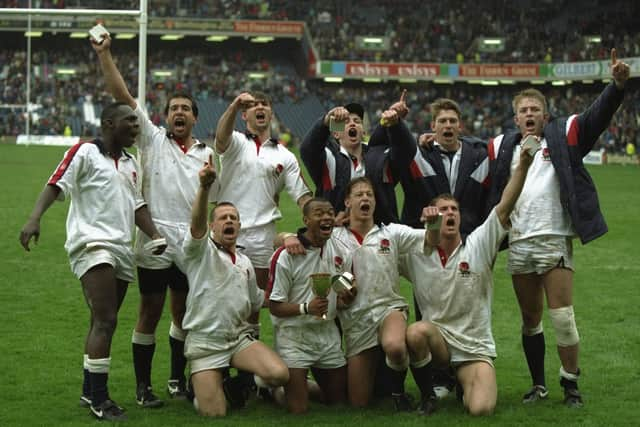

A World Cup winner… with England
Advertisement
Hide AdAdvertisement
Hide AdBack to that miraculous France game: if Scotland had been free jazz then there was a trad fan in the stand who was distinctly unimpressed. Then director of rugby, Jim Telfer’s harrumphing has gone down in history but Dods explains it thus: “He thought we were too loose. All we’d done is win one game. There were big risks in continuing to play that way. And while he took the pragmatic view he was hugely respected by the players.”
But soon it would be Telfer, finalising the squad for a tour of New Zealand, who was telling Dods he wouldn’t be on the plane because he “wasn’t good enough”. Once again our man bowed to the guru’s superior knowledge. “I’m not going to lie, that was tough, because I never played for Scotland again. But Jim is a straight shooter. He doesn’t sugar-coat things and he’s not going to bullshit you. Rugby was changing and I think it was his view that Scotland needed bigger guys. I’d never get a game now, only weighing 12 stone when most of the backline these days will be 15 and 16. I’m older and wiser and realise I was lucky to play when I did and get my eight caps. Of course, I’d like to have turned out many more times for my country because it was a huge thrill but I don’t forget that I might only ever have had those eight seconds.”
A bad knee injury robbed Dods of some of his pace - “My main weapon” - and a club career which had taken him to Northampton and Otago would wind down enjoyably back at Gala. But that is not the end of his tale, oh no. Today you’ve been reading about a Scot who’s a World Cup winner.
This was the first-ever Sevens World Cup, staged at Murrayfield in 1993. Scotland as hosts supplied a pool of 20 men on whom the competing nations could call as guest players in the event of injuries, the two-day format precluding them from flying in replacements.
“I’d toured Australia, Fiji and Hong Kong with Scotland in preparation for the tournament but was then dropped from the squad into this group,” he explains. “By the time of the semi-finals I was munching pies, not thinking I would be required, but then I got told: ‘England need you.’ Damian Hopley had hurt his knee so I had to sit on their bench in full kit while the rest of the Scottish boys up in the stand were giving me pelters and shouting ‘Traitor!’
“I was praying I wouldn’t have to come on. England played Fiji who were overwhelming favourites for the World Cup but my new team won. I was wondering: ‘What would be worse? I play in the final, miss the tackle which gifts Australia the cup, or England go and win it? I hadn’t yet been capped by Scotland and was desperately hoping I would be. Well, England did win it. The rest of the English guys wanted to keep their shirts but I was very keen to swap mine. They went to collect their medals; I stayed on the pitch. I had a few drinks with them that night, which was fine, and thought: ‘Right, I’ve done my good deed but that’s it over.’ Then a few weeks later a package arrived for me at Gala and inside was my medal.
“Obviously, Pete winning the Slam trumps everything but I’m a quiz question, aren’t I?” And the man who scored all the points in one of the most what-just-happened? games Murrayfield has ever seen.
A message from the Editor:
Thank you for reading this article. We're more reliant on your support than ever as the shift in consumer habits brought about by coronavirus impacts our advertisers.
If you haven't already, please consider supporting our trusted, fact-checked journalism by taking out a digital subscription.
Comments
Want to join the conversation? Please or to comment on this article.